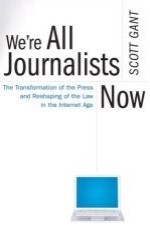That’s what Ana Marie Cox said during last Sunday’s McLaughlin Group discussion devoted to “new media.” The panelists didn’t mention that neither New Media nor the older term for it—Web 2.0—is very new, but they clearly weren’t assuming their television audience to be Net-savvy multitaskers: Even blog was explained graphically (WEB + LOG) for those not yet up to speed.
Panelist Scott Gant’s book was cited, too, but one of the most genuinely important aspects (in my opinion) of New Media’s journalistic standards never came up. I raised my point in the following feedback submission:
Dear McLaughlin Group staff,
I enjoyed the discussion on September 2, 2007, about evolving journalistic practices in the Internet era, though I was a little surprised to see “new media” still treated as though it’s news.
In Ana Marie Cox’s words, “Anyone can commit an act of journalism.” That statement’s implicit allusion to vandalism made me realize that one area in which old media diverges significantly from the new is adherence to (or disregard for) conventions of style and usage. Generally speaking, dot-com companies—and individuals who self-publish on the Internet—don’t have access to, or possibly even perceive the need for, the editing and proofreading resources taken for granted in traditional mass media.
I wonder if it might be newsworthy that some people are actively trying to remedy that disparity. Even vigilant volunteers (as, for instance, at Wikipedia) are promoting a less anarchic, more grammatical model for the user-generated content that drives “Web 2.0.” Of course, it’s great to get the details right on principle—but when represented only by words, one’s reputation and success could be at stake, too. Raising people’s awareness of the role our writing plays is the first step of enterprises like my own (www.sharpermessage.com).
Best regards,
Whoops! I forgot to end my message with “BYE BYE.”

